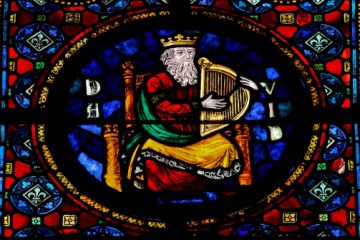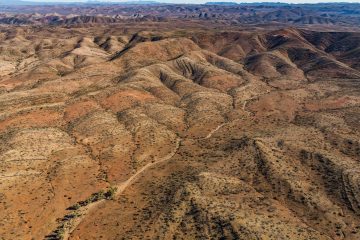Scripture: Zechariah 8: 1-8
Sermon: Holding on to Hope
Topics: acedia, care, passion, hope, blessings
Preached: April 3, 2022
Rev. Mike Abma
Preamble: Zechariah is a prophet who lived at the same time as Haggai, the prophet we heard from last week. This is the time soon after the exiles returned from their exile in Babylon. A curious Bible note: the New Testament book of Revelation, the last book of our Bible, quotes the prophet Zechariah more than any other Scripture.
Zechariah 8: 1-8 The Lord Gives 5 Blessings
The word of the Lord of hosts came to me, saying:
2Thus says the Lord of hosts: I am jealous for Zion with great jealousy, and I am jealous for her with great wrath.
3Thus says the Lord: I will return to Zion, and will dwell in the midst of Jerusalem; Jerusalem shall be called the faithful city, and the mountain of the Lord of hosts shall be called the holy mountain.
4Thus says the Lord of hosts: Old men and old women shall again sit in the streets of Jerusalem, each with staff in hand because of their great age. 5And the streets of the city shall be full of boys and girls playing in its streets.
6Thus says the Lord of hosts: Even though it seems impossible to the remnant of this people in these days, should it also seem impossible to me, says the Lord of hosts?
7Thus says the Lord of hosts: I will save my people from the east country and from the west country; 8and I will bring them to live in Jerusalem. They shall be my people and I will be their God, in faithfulness and in righteousness.
This is the Word of the Lord
Thanks be to God
INTRODUCTION
Gabriel Garcia-Marquez’ 1985 novel, Love in the Time of Cholera, begins by describing an older couple who have been married for decades. He is a doctor who always rises early in the morning. For years, his wife has resented this. The truth is, they both have resentments that have built up over the years. One day, these resentments come bubbling to the surface. The husband claims he has been showering all week without soap – implying that his wife had forgotten the soap. She yells back that she has been showering all week with soap. So it goes, back and forth – there was no soap; yes, there was soap. They end up lying in bed, back to back. Each is waiting for the other to turn. Each is waiting for the other to apologize. A silent tension sets in. This goes on for days, for weeks, for months. Whatever passion was left in their relationship begins to drain away. They drift apart. He moves out and starts sleeping at work in the hospital. They are not even sure if they care whether things get patched up.[1]
ISRAEL and GOD
So it also was in the relationship between God and Israel at the time of the prophet Zechariah. Just before the passage we read from chapter 8, God speaks of this impasse.
“When I tried to speak to you, you would not listen;
When you tried to speak to me, I would not listen.” (Zechariah 7:13).
They were not on speaking terms.
Earlier in Zechariah, God implores his people with
“Turn to me, and I will turn to you.” (Zechariah 1:3)
But there did not seem to be any turning.
And we can see why.
Israel had just endured 70 years of exile.
Israel had returned to a city in ruins.
Israel was still threatened by her neighbors.
For Israel, it felt like 70 years of God’s silence.
They were disappointed by God.
They began to wonder whether their centuries-old relationship with God was really worth it.
God and Israel weren’t speaking, weren’t listening.
They were drifting apart.
In time, they weren’t even sure they cared enough
whether the relationship was restored or not.
ACEDIA
The Desert Fathers – those monks who lived in the wilderness during the late Roman Empire – well, these Desert Fathers had a word for this.
When we become weary of the world,
weary of each other,
weary of the church,
and even weary of God
then something begins to infect our hearts.
They called this something acedia.
Acedia.
It is from a Greek word meaning “not caring.”
Once resentments set in,
once weariness sets in,
we start not caring.
We start not caring about anything.
We start not caring
because nothing has much meaning,
because nothing brings much joy,
and because nothing seems worth it anymore.
A modern author who knew about this was the late novelist David Foster Wallace.
Wallace once noted that acedia is the dominant spiritual plague of the modern world.[2]
Wallace may very well have had a point.
Think of our modern world.
We doom-scroll through our phones.
We doom-surf on our laptops.
We fixate on how everything is broken,
and nothing can be fixed.
We become listless,
and obsessed with mindless activities
like binge-watching one Netflix series after another.
Everything takes on a certain dullness.
We begin to ask of everything
1. is it worth it?
2. do I even care?
This also infects our relationship with God.
Even if we have known of God for decades,
we begin to wonder:
“Does God really care for me?
Do I really care for God?”
We are not sure of the answer.
We try pray, and praying seems pointless.
We try read the Bible, and nothing seems to make sense.
Acedia starts to set in.
We start to not care.
We start to give up:
to give up on marriage,
to give up on work,
to give up on church,
to give up on hope.
GOD SPEAKS THROUGH ZECHARIAH
Zechariah the prophet comes to us this morning
with the voice of God’s passion for us, his people.
Over and over again, God speaks through Zechariah,
trying to convince people then and people now,
that He has not given up on his people,
and that He cares for them deeply.
Our passage this morning is actually a list of five blessings God gives us, his people.
Blessing # 1 “I am jealous for Zion with great jealousy.”
It is easy to stumble over the word “jealous.” To think of jealous as a negative thing. But if that is how we are hearing it, we are hearing it incorrectly.
God is saying, “I have eyes only for you!”
This is love language.
This is passion talk.
This God is laying it on the line – restoring the relationship with us means everything to Him.
Blessing # 2 “I will dwell in the midst of you.”
God is basically saying, “I am not moving out.”
In fact, in Jesus Christ, we know God literally moves in with us.
Why? So that we can stay together – covenantally together, through thick and thin.
God devoted to us; and us, faithful to him.
Blessing #3 “O my people, who only see ruin and brokenness, picture this:
picture old men and women having coffee, leaning on their canes, smiling and watching young kids happily playing in the streets.
Why this picture?
This is a picture of hope.
This is a picture of joy.
This is a picture of how life should be.
God wants us to hold on to this picture.
Blessing # 4 God says “This picture may seem impossible to you.
All you can see are ruins.
All you experience is brokenness.
All you feel is emptiness.
A picture of hope like this seems impossible.
A picture like this seems unrealistic.
But is it?
Is such a thing out of reach for me, your God?”
Blessing #5 Listen, I will gather my people.
I will gather them from the ends of the earth.
I will gather all those who have drifted away,
all those who have wandered off.
I will gather them.
They shall be my people.
I shall be their God.
Can you hear in these blessing God’s re-committal to his people?
Can you hear his covenantal heart come beating through?
Can you hear God saying, “I love you.
I care for you”
as clearly as he can?
BELDEN LANE
Belden Lane is a professor of historical theology. He is a leading authority on the Desert Fathers, and has written about their warning to us about this spiritual illness called acedia.[3]
Recently he wrote not about the Desert Fathers but about his own personal struggles. You see, this past year his 40-year old son died of cancer.
Two things made this death particularly painful:
1. his son went through his cancer treatments during COVID with all its restrictions. This was hard on everyone.
2. his son was a recovered alcoholic. After years of grief and disappointment, his son was finally dry, finally sober, finally thriving. And then this?
Belden Lane writes that he felt empty.
He did not know what to pray for.
He did not even know if he could pray.
And perhaps most telling, prayer seemed pointless.
Belden Lane decided to spend some time in the wilderness of New Mexico alone,
in silence of this impasse he had with God.
After three days in the desert, a question kept coming to his mind:
“Have I ever truly trusted God?
Have I ever fully loved God?”
That is when a memory came back to him.
A memory of when he was a 10-year old boy,
in a Sunday School class
that met in the basement of the church.
It was a memory of him as a 10-year old
busily writing and illustrating his own book.
At age 10, he was so moved by what Jesus did on the cross,
so moved by Jesus’s deep love for us,
his deep passion for us
that he felt compelled to make this book.
The memory moved him –
moved him to tears:
not tears of sadness, but of gladness;
not tear of emptiness, but tears of fullness.
There he was,
in the desert,
in the dark,
waiting for the dawn,
and he was humming hymns, those old hymns,
hymns that expressed God’s deep mysterious love for us,
hymns that expressed our rock-solid hope in him.[4]
CONCLUSION
Early in Zechariah 7 Israel asks this question:
“Should we keep fasting and mourning?”
Apparently, they had been fasting and mourning for 70 years,
all the years of their exile,
all the years of God’s apparent silence.
At the end of chapter 8 God answers their question.
God says, “Make your fasting like feasting.
Make them festivals of joy and gladness.
For you are my people, and I am your God.
This is the season of Lent.
This is our own season of fasting and lamenting
the troubles of our lives and the troubles of the world.
And yet, may we come to this Table with joy,
may we feast with gladness,
knowing beyond our doubts
that we are loved by the Lord;
knowing beyond our emptiness
that Christ died to fill us with all his blessings.
AMEN
-
Gabriel Garcia Marquez, Love in the Time of Cholera, pp. 27-29. ↑
-
See Wallace’s diagnosis of modern acedia in Michael J. O’Connell, “Your Temple is Self and Sentiment: David Foster Wallace’s Diagnostic Novels,” in Christianity and Literature Vol. 64 (3), 2015, pp. 280-285. ↑
-
Belden Lane is a professor of theological studies at St. Louis University. He has written about the Desert Fathers and acedia in “Caring and Not Caring” Christian Century, May 18, 2010. ↑
-
See Belden Lane, “After My Son Died, I Went Looking for God in the Desert,” in Christian Century March 2, 2022. ↑



0 Comments